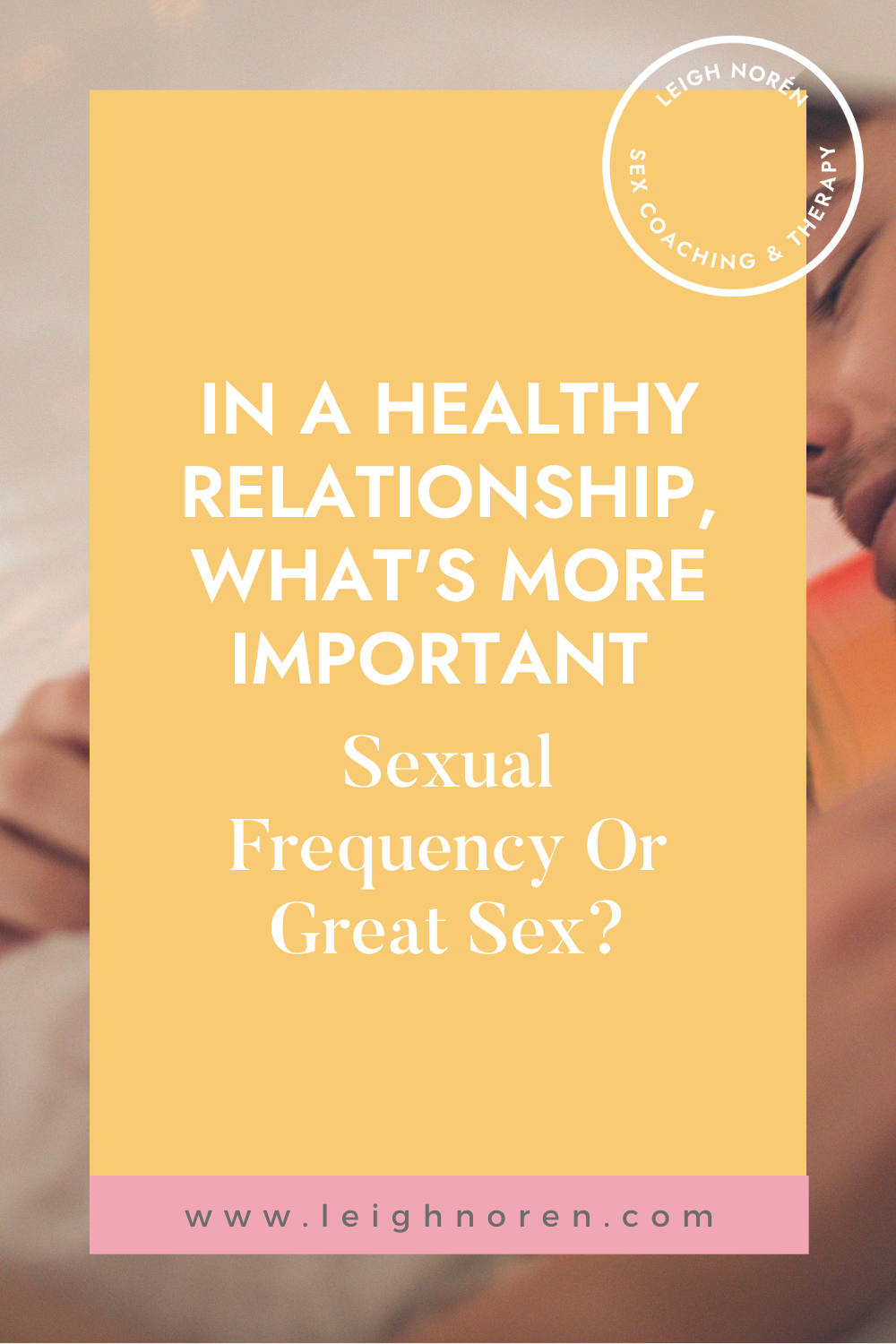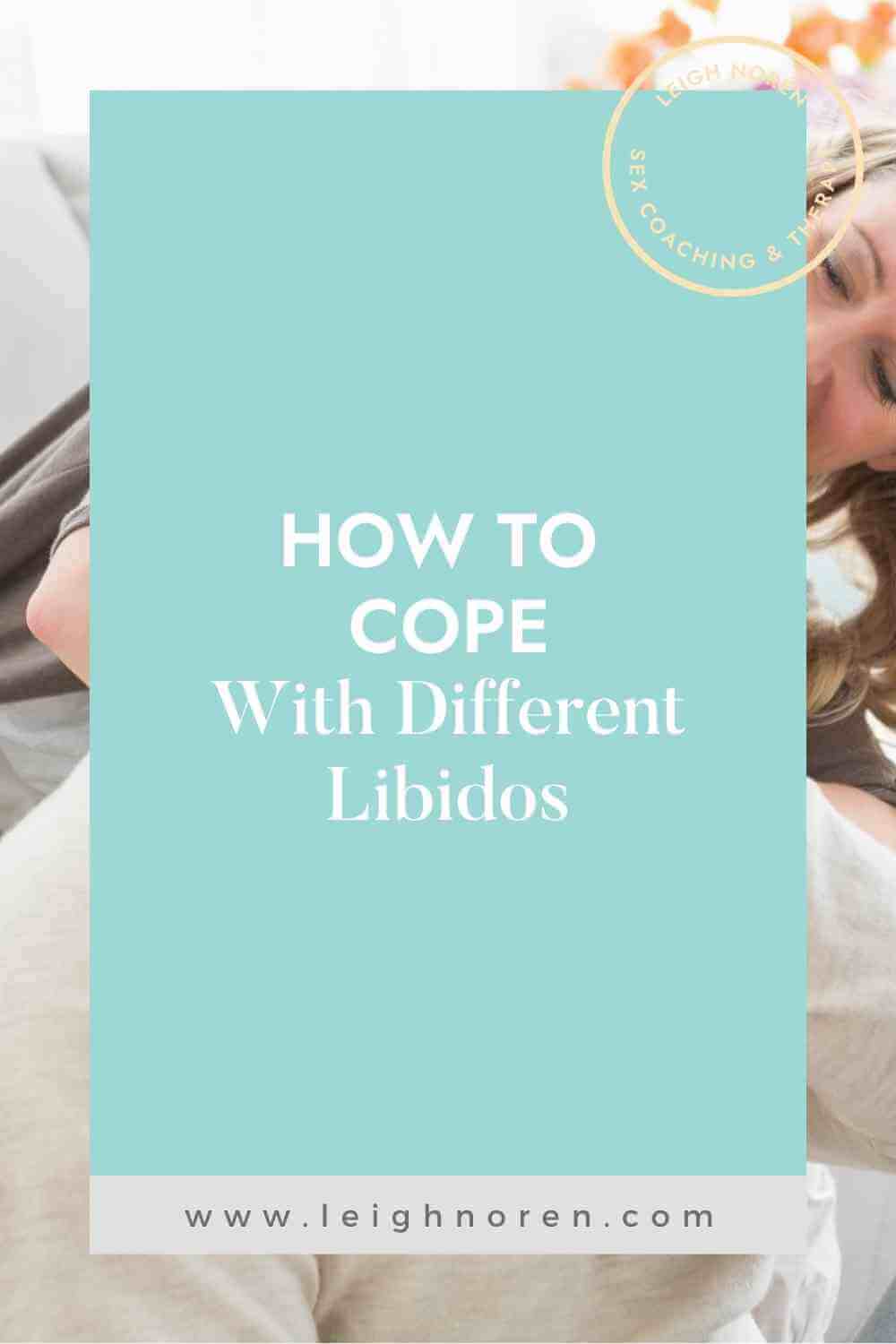In A Healthy Relationship, What’s More Important Sexual Frequency Or Great Sex?
6 minute read
When it comes to healthy relationships, the million-dollar question is – what makes us ultimately happier: quality or sexual frequency?
As a sex therapist and sex coach, I can tell you that the answer is truly subjective. But – as always, with a few caveats.
Because the reality is – the quality of the sex you’re having – is what determines the “healthiness” of your sex life.
But at the same time, what one person feels is great sex can vary greatly from another. So the answer to what is healthier lies in the personal tastes and preferences of each individual.
What I often hear from people are two sides of the same coin:
Sometimes, people feel both frequency and quality are equally important. But oftentimes there’s a difference within relationships, especially in couples with different libidos.
One partner thinks: “Sex is healthy for me when it’s satisfying; when there is a mind-blowing orgasm or soulful connection that leaves me tingling in my toes.”
The other partner believes: “Sex is healthy for me when it happens often; the time spent connecting with my partner refreshes our relationship and keeps us connected.”
Both answers are equally as true and are speaking to the quality of the sexual experience – and what that does to keep their relationship alive. And, it also speaks to how we all like to feel loved and cared for in different ways.
When a couple has two different ways of experiencing love – sex can be challenging.
Expressions of love in the form of sex are not felt in the same way by everyone. Perhaps that seems obvious – but obvious or not – it is one of the long-standing reasons why couples struggle with sex and intimacy.
If you feel loved when you have lots of sex and your partner feels loved when you have really infrequent great sex, it can pose a problem.
Why?
Because all-too-often couples don’t talk about these differences. And they often don’t talk about what kind of sex they want in order to feel like they’re in a healthy, happy relationship.
Over time, this can easily turn into conflicts about sex.
Perhaps you start by arguing about who has or hasn’t taken out the rubbish more times this week. And before you know it – you’re both throwing out accusations about your sex life (or lack thereof).
Because with a subject so awkward – it’s easier to talk about it once you’re already annoyed with one another. And rarely does this lead to more connection – but rather disconnect and feeling like worlds apart.
WANT YOUR SEX DRIVE BACK?

My free resource The Desire Test helps you take that first step towards an increased sex drive, by understanding your decreased desire.
Take the 10-page assessment quiz, get the answers you need to understand what’s standing in the way of your desire, and get free sex and relationship tips directly to your inbox. You can unsubscribe at any time.
What science says about sexual frequency versus great sex
Beyond my experience working with countless couples who are stuck in the age-old question of sexual frequency versus great sex – leaning on science to answer this question is always helpful.
According to a study in Social Psychology & Personality Science, couples who had sex once a week were happier than couples who had sex more than once a week.
This is interesting because it shows how our beliefs about sex as a barometer of how marriage happiness – aren’t necessarily true.
If it were true – one might expect to see that the more sex you have – the happier your relationship is.
But it’s equally important to remember what might make you happy in your relationship might not always mimic scientific studies.
For you, maybe sex once a month, twice a year, or several times per week is the most important. Because it is always individual.
Healthy relationships are defined by two people who share a mutual experience where both people’s needs are met.
In order for you and your partner to both feel like your needs are being met – you will inevitably need to show love in ways your partner wants love.
But – if you’re the low-desire partner – this doesn’t mean having sex you don’t want or sex that causes anxiety.
In fact, doing that – giving in to your partner’s desire for frequent sex – might actually put your relationship at risk.
Why?
Because having unsatisfying sex (either in frequency or quality) teaches your body that sex doesn’t give you what you want.
When you do this you are literally training your brain that sex is underwhelming and this – reduces your sex drive. Because your mind and body are smart – and they’re going to do everything they can to protect you from things they feel aren’t in your best interest.
And when you’re continuously having underwhelming sex, which keeps reducing your desire, it can be a scary place to be in.
It can feel like you’re stuck and have no idea how to get out and restart your intimate connection.
So, how do you still give your partner what they want when you’re in this place?
For sex to be healthy, couples need to talk about their shared sexual experience.
Mutuality is always the goal; you want a shared experience that feeds both of your needs for connection, intimacy and closeness.
You can unearth what that looks like by talking with your partner. And yes, I know talking about sex can sometimes be incredibly awkward. But the thing is – couples who have great, mutually satisfying sex lives, are the couples who actually talk about sex.
It’s a prerequisite, not a nice-to-have, and once you start talking about sex, it’s usually easier to keep having these conversations.
Here are a few questions to get you started having a judgment-free conversation about sex:
- What kinds of sex do you want?
- How frequently do you want to have sex to feel close?
- What kinds of sex feel amazing such that you want to do it again (whenever that may be)?
- What do you need to feel in order for sex to feel exciting and compelling?
And remember as you listen to one another that the value of sex is how you both value it. Neither you nor your partner is right about it. It’s about coming together as a team to see how you can create a mutually fulfilling sex life.
You can learn more tips here in my blog post: how to ask for sex without pressuring your partner (and other communication rules for great sex).
Sex in and of itself isn’t the holy grail of relationship health
I know, weird to hear this from a sex therapist, right? But it’s true. And in fact, having lots of sex when you don’t want it can have the opposite effect.
Sure your partner may be happy for a while – but it ultimately backfires because giving something that you don’t want to give creates a negative relationship with sex in your mind. Ultimately, pushing you further away from one another and causing resentment and sexual anxiety.
To create a truly healthy relationship – it’s important to remind yourself that sexual frequency is merely one detail. One component on a long list of ingredients in a long-lasting relationship.
And that frequency in and of itself – doesn’t necessarily define or make a happy relationship.
However, if sex is a big part of how you both show and experience love, you need to have a conversation with your partner. One about how to strive to meet both your needs.
Because you get to set the rules for what you want your life and relationship to look like. What your friends do or don’t do (or the rest of the world for that matter) – doesn’t actually matter at all.
If you’re feeling like sex or desire are at the root o your challenges as a couple, I can help.
As a sex therapist and coach I’ve helped over 1000 couples pick up the pieces of their relationship and put them back together again.
Whether you feel stuck in the sexual department or stuck in multiple – I’m here to help you turn it around. So you can experience fireworks and fun in the bedroom again, like you used to.
In my online program ReDesire I help you access your desire through a series of carefully curated exercises and weekly 1:1 on-the-go coaching. Learn more here today and take your first step towards more and better sex (the kind you deserve).

Zero sex drive?
You’re not alone! Download the 10-page Desire Test to find out why your desire for sex is gone (and what to do about it).
Questions based on a variety of factors proven to negatively affect desire
Find out which factors are responsible for your low or non-existent sex drive
Get instant access to expert advice, delivered directly to your inbox when you download The Desire Test. Unsubscribe anytime.
WANT TO KNOW MORE ABOUT THE DESIRE TEST?
With 9 years of experience as a sex therapist and coach - Leigh helps her clients create stress-free, shame-free, pressure-free sex lives, through her unique combination of sexological science, & psychotherapeutic & coaching tools.
OTHER POSTS YOU MIGHT ENJOY
Copyright © 2019-2026 Leigh Norén. All Rights Reserved. | Website by Pinegate Road
Cookie policy | Terms & Conditions | Privacy Policy


